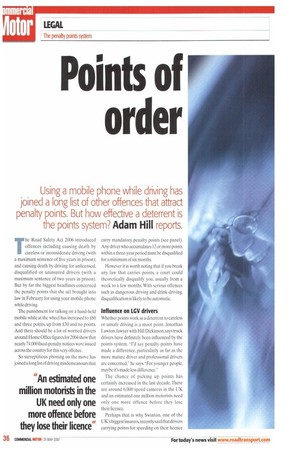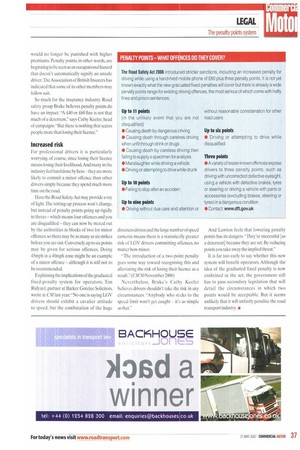Points of order
Page 36

Page 37

If you've noticed an error in this article please click here to report it so we can fix it.
Using a mobile phone while driving has joined a long list of other offences that attract penalty points. But how effective a deterrent is the points system? Adam Hill reports.
The Road Safety Act 2006 introduced offences including causing death by careless or inconsiderate driving (with a maximum sentence of five years in prison); and causing death by driving for unlicensed, disqualified or uninsured drivers (with a maximum sentence of two years in prison). But by far the biggest headlines concerned the penalty points that the act brought into law in February for using your mobile phone while driving.
The punishment for talking on a hand-held mobile while at the wheel has increased to £60 and three points, up from £30 and no points. And there should be a lot of worried drivers around: Home Office figures for 2004 show that nearly 74,000 fixed-penalty notices were issued across the country for this very offence.
So surreptitious phoning on the move has joined a long list of driving misdemeanours that carry mandatory penalty points (see panel), Any driver who accumulates 12 or more points within a three-year period must be disqualified for a minimum of six months.
However it is worth noting that if you break any law that carries points, a court could theoretically disqualify you, usually from a week to a few months. With serious offences such as dangerous driving and drink-driving, disqualification is likely to be automatic.
Influence on LGV drivers
Whether points work as a deterrent to careless or unsafe driving is a moot point. Jonathan Lawton, lawyer with Hill Dickinson, says truck drivers have definitely been influenced by the points system. "I'd say penalty points have made a difference, particularly as far as the more mature driver and professional drivers are concerned," he says. -For younger people, maybe it's made less difference."
The chance of picking up points has certainly increased in the last decade. There are around 6,000 speed cameras in the UK and an estimated one million motorists need only one more offence before they lose their licence.
Perhaps that is why Swinton, one of the UK's biggest insurers, recently said that drivers carrying points for speeding on their licence would no longer be punished with higher premiums. Penalty points, in other words, are beginning lobe seen as an occupational hazard that doesn't automatically signify an unsafe driver.The Association of British Insurers has indicated that some of its other members may follow suit, So much for the insurance industry. Road safety group Brake believes penalty points do have an impact. "A £40 or £60 fine is not that much of a deterrent," says Cathy Keeler, head of campaigns. "But there is nothing that scares people more than losing their licence."
Increased risk
For professional drivers it is particularly worrying, of course, since losing their licence means losing their livelihood. And many in the industry feel hard done by here —they are more likely to commit a minor offence than other drivers simply because they spend much more time on the road.
Here the Road Safety Act may provide a ray of light, The totting-up process won't change, but instead of penalty points going up rigidly in threes —which means four offences and you are disqualified — they can now be meted out by the authorities in blocks of two for minor offences, so there may be as many as six strikes before you are out. Conversely, up to six points may be given for serious offences. Doing 45mph in a 40mph zone might be an example of a minor offence — although it is still not to be recommended.
Explaining the implications of the graduated fixed-penalty system for operators, Tim Ridyarci, partner at Barker Gote lee Solicitors, wrote in CM last year: "No one is saying LGV drivers should exhibit a cavalier attitude to speed, but the combination of the huge distances driven and the large number of speed cameras means there is a statistically greater risk of WV drivers committing offences, no matter how minor.
The introduction of a two-point penalty goes some way toward recognising this and alleviating the risk of losing their licence as a result." (CM 30 November 2006) Nevertheless, Brake's Cathy Keeler believes drivers shouldn't take the risk in any circumstances. "Anybody who sticks to the speed limit won't get caught — it's as simple as that." And Lawton feels that lowering penalty points has its dangers. "They're successful [as a deterrent] because they are set. By reducing points you take away the implied threat."
It is far too early to say whether this new system will benefit operators. Although the idea of the graduated fixed penalty is now enshrined in the act, the government still has to pass secondary legislation that will detail the circumstances in which two points would be acceptable. But it seems unlikely that it will unfairly penalise the road transport industry. •






















































































































































































